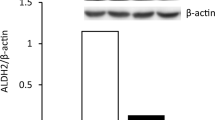Abstract.
It is hypothesized that although the overall metabolism of ethanol in the brain is very limited, a very small percentage of the brain tissue may carry out that little amount of metabolism. Specifically, hydrogen peroxide may be used as a co-substrate for the metabolism of ethanol to acetaldehyde by catalase and the action of monoamine oxidase in the monoaminergic neurons would supply the hydrogen peroxide. This production of acetaldehyde may result in the formation of novel metabolites that provide the rewarding stimulus for the consumption of ethanol. To test this hypothesis, a reversible inhibitor of the A-isoform of monoamine oxidase, BW A616U, was compared to irreversible inhibitors of one or both MAO-A and B isoenzymes. Doses of 12.5–75 mg/kg p.o. BW A616U reduced the behavioral effects, ptosis and catalepsy, due to monoamine depletion by 2.5 mg/kg reserpine, but these signs of monoamine depletion were evident 24 h after injection. In the cyanamide-induced drinking rat, 50 mg/kg BW A616U reduced consumption of ethanol by 37%. Phenylzine, an irreversible MAO-A and B inhibitor, reduced consumption of ethanol by 67%, but also food consumption; however, the intake of both increased during the post-treatment period. The MAO-B inhibitor, R(-)-deprenyl, was without effect. Both BW A616U, 50 mg/kg and 75 mg/kg, and 2.0 mg/kg i.p. clorgyline reduced the consumption of ethanol in the genetic drinking Myers high-ethanol preferring (mHEP) rat and reduced the proportion of ethanol consumed to total fluids by over 50%. Again, R(-)-deprenyl was without effect. Clorgyline also markedly reduced the intake of food during the 3-day treatment period, only. However, the consumption of ethanol remained depressed during the 4 days after either 75 mg/kg BW A616U or clorgyline. These data demonstrate that inhibition of MAO-A, but not MAO-B, reduces the volitional consumption of ethanol probably by preventing the formation of both biogenic aldehydes and acetaldehyde so that rewarding alkaloidal products cannot be formed.
Similar content being viewed by others
Author information
Authors and Affiliations
Additional information
Electronic Publication
Rights and permissions
About this article
Cite this article
Mega, B.T., Sheppard, K.W., Williams, H.L. et al. On the role of monoamine oxidase-A for the maintenance of the volitional consumption of ethanol in two different rat models. Naunyn-Schmiedeberg's Arch Pharmacol 366, 319–326 (2002). https://doi.org/10.1007/s00210-002-0616-0
Received:
Accepted:
Issue Date:
DOI: https://doi.org/10.1007/s00210-002-0616-0




